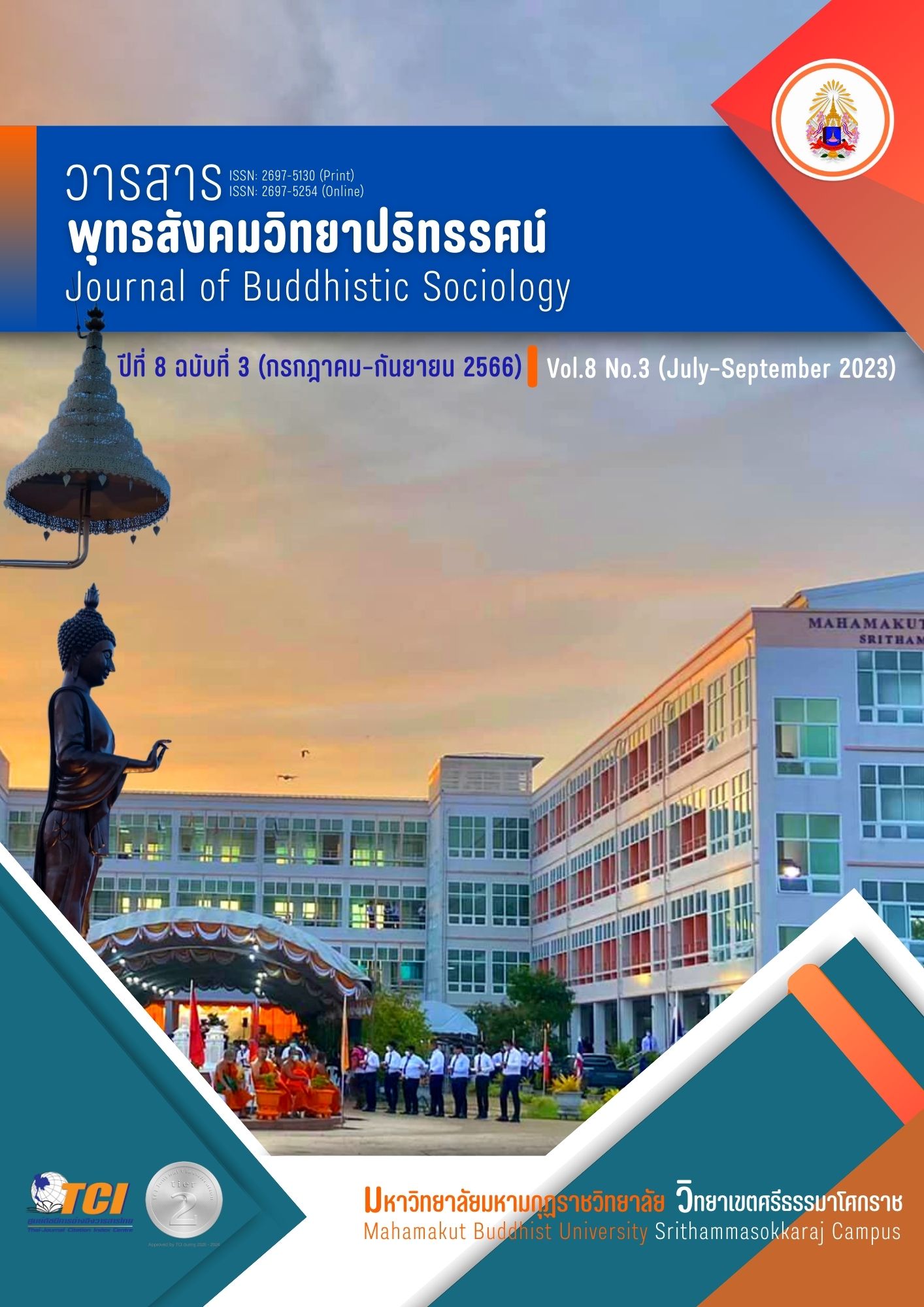A SYSTEM OF TEAM TEACHING USING EXPERIENCE - BASED APPROACH FOR STUDENT TEACHERS AT MAHAMAKUT BUDDHIST UNIVERSITY, SRITHAMMASOKKARAJ CAMPUS
Main Article Content
Abstract
The study consisted of the following objectives: 1) to develop a system of team teaching using experience-based approach for student teachers at Mahamakut Buddhist University, Srithammasokkaraj Campus; 2) to test the efficiency of a team teaching system using experience-based approach for student teachers at Mahamakut Buddhist University, Srithammasokkaraj Campus; and 3) to certify a system of team teaching using experience-based approach for student teachers at Mahamakut Buddhist University, Srithammasokkaraj Campus. The study employed research and development (R&D) method. The sample group used included the following: 1) 13 experts; 2) 70 student teachers at Mahamakut Buddhist University, Srithammasokkaraj Campus. The developed teaching system was experimented for its initial efficiency on 3 individuals, a group of 9 persons, and 30 participants in a field study, for a total of 42 persons. It was also used to teach with a sample group of 28 persons to find the efficiency of the teaching system; and 3) The efficiency of the teaching system was assessed by experts. The statistics used included mean, percentage, standard deviation, content validity, questionnaire reliability, and a comparison of competency test scores.
The following results are found:
1. A system of team teaching using experience-based approach for student teachers at Mahamakut Buddhist University, Sri Thammasokrat Campus consists of the following elements: 1) Context analysis 2) Input 3) Process 4) Output and 5) Feedback.
2. From testing the efficiency of a team teaching system using experience-based approach in a field study, the findings revealed efficiency E1/E2 equal to 84.07/ 85.46, which is according to the standard criteria of 85/85.
3. From certifying a system of team teaching using experience-based approach by considering the 5-level criteria, the findings found that the mean is equal to 4.43, indicating that the propriety is at the highest level.
Article Details

This work is licensed under a Creative Commons Attribution-NonCommercial-NoDerivatives 4.0 International License.
References
ชัยยงค์ พรหมวงศ์. (2523). ระบบสื่อการสอน. ใน ในชุดวิชาเทคโนโลยีและสื่อสารการศึกษา เล่ม 1 หน่วยที่ 1-5. นนทบุรี: มหาวิทยาลัยสุโขทัยธรรมาธิราช.
ชัยยงค์ พรหมวงศ์. (2545). การวางแผนการสอนและเขียนแผนการสอน. ใน เอกสารการสอนชุดวิชาวิทยาการการสอน หน่วยที่ 8-15 (พิมพ์ครั้งที่ 7). นนทบุรี: มหาวิทยาลัยสุโขทัย
ธรรมาธิราช.
ชัยยงค์ พรหมวงศ์. (2545). การวางแผนการสอนและเขียนแผนการสอน. ใน เอกสารการสอนชุดวิชาวิทยาการการสอน หน่วยที่ 8-15 (พิมพ์ครั้งที่ 3). นนทบุรี: มหาวิทยาลัยสุโขทัย
ธรรมาธิราช.
ชัยยงค์ พรหมวงศ์. (2556). การทดสอบประสิทธิภาพสื่อและชุดการสอน. วารสารศิลปากร ศึกษาศาสตร์วิจัย, 7-19.
ทิศนา แขมมณี. (2547). ศาสตร์การสอน: องค์ความรู้เพื่อการจัดกระบวนการเรียนรู้ที่มีประสิทธิภาพ (พิมพ์ครั้งที่ 3). กรุงเทพมหานคร: ด่านสุธา.
นงนุช เสือพูมี และคณะ. (2560). การจัดการเรียนรู้แบบประสบการณ์ทางการพยาบาล. วารสารพยาบาลกระทรวงสาธารณสุข, 27(1), 12-21.
พิชาติ แก้วพวง. (2563). ศาสตร์การจัดการเรียนรู้สังคมศึกษา. กรุงเทพมหานคร: จุฬาลงกรณ์มหาวิทยาลัย.
ยงยุทธ เกษสาคร. (2541). ภาวะผู้นำและการจูงใจ. กรุงเทพมหานคร: เอส แอนด์ จี กราฟิก.
สำนักการศึกษา กรุงเทพมหานคร. (2550). หลักเกณฑ์และวิธีการให้ข้าราชการครูกรุงเทพมหานครมีวิทยฐานะและเลื่อนวิทยฐานะสายงานการสอน. กรุงเทพมหานคร: มหาวิทยาลัยธรรมศาสตร์.
สำนักงานคณะกรรมการกฤษฎีกา. (2562). พระราชบัญญัติการอุดมศึกษา พ.ศ. 2562. เรียกใช้เมื่อ 20 มิถุนายน 2565 จาก
chromeextension://efaidnbmnnnibpcajpcglclefindmkaj/https://www.mhesi.go.th/images/2563/pusit/legal-all/1p2562.pdf
สำนักงานคณะกรรมการข้าราชการพลเรือน. (2552). คู่มือสมรรถนะหลักคำอธิบายและพฤติกรรมบ่งชี้. กรุงเทพมหานคร: สำนักงานคณะกรรมการข้าราชการพลเรือน.
Honey, P., & Mumford, A. (1992). The manual of learning styles (2 ed.). Maidenhead, K: Peter Honey and Alan Mumford.
Kolb, A. Y., & Kolb, D. A. (2005). Learning styles and learning spaces: Enhancing experiential learning in higher education. Academy of Management Learning & Education, 4(2), 193-212.
Parker, G. M. (1990). Team player and team work: The new compettitive business strategy San Francisco. Calif.: Jossey-Bass.


